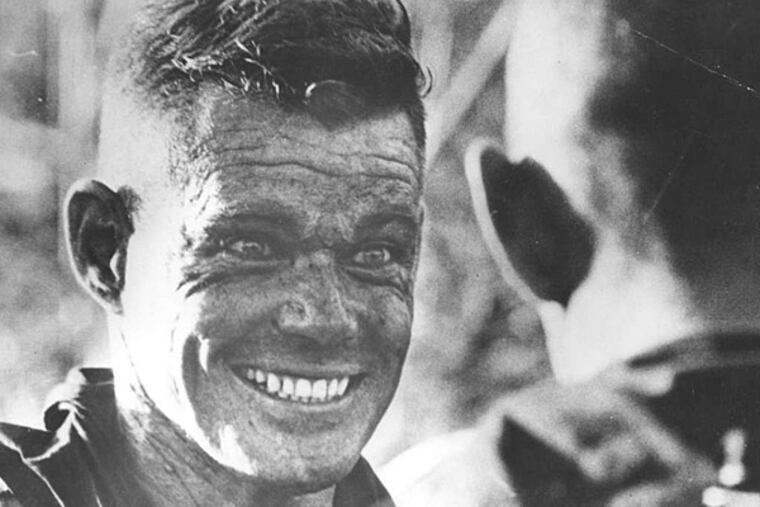At Penn, honoring efforts of a scholar and soldier
By Brian Wright O'Connor Nearly 50 years after leaving the University of Pennsylvania for Vietnam, Lt. Col. Mortimer Lenane O'Connor will receive a posthumous Ph.D. today in a ceremony honoring academic achievement and sacrifice on the field of battle.

By Brian Wright O'Connor
Nearly 50 years after leaving the University of Pennsylvania for Vietnam, Lt. Col. Mortimer Lenane O'Connor will receive a posthumous Ph.D. today in a ceremony honoring academic achievement and sacrifice on the field of battle.
My father, who set aside his dissertation to lead soldiers in war, will be included in the Class of 1968, the year he would most likely have completed his doctorate had fate not intervened.
Born in 1930, my dad grew up in the company of soldier-storytellers on Army garrisons from Manila to the Old West, and watched his own father and three uncles set off for war in Europe.
The whiff of cordite and tales of valor turned him into an infantry officer with a taste for ballads and bravado. He walked off demerits at West Point while reciting Rudyard Kipling and told the story of Beowulf around the family campfire as a bare-knuckled brawl between an Airborne Ranger and a Nazi monster.
In 1958, my dad was sent to Penn to study English in preparation for teaching at West Point. In his year at Penn, the young officer set aside the Cold War for Chaucer and refined his taste for poetry and prose.
After that teaching assignment and a year in Korea, my dad returned to Penn - living in Willingboro with Betsy and the six kids, teaching at Temple, and plodding through Ph.D. course work and research.
He studied German vocabulary flash cards late into the night, long after reading Dickens to us on the living room couch. My mother typed up his papers on a battered Smith-Corona. He took some of the boys on summer bivouac with ROTC troops to Indiantown Gap. Quoting T.S. Eliot's "The Hollow Men," he would intone, "This is the way the world ends, this is the way the world ends," as we hand-loaded rounds into mortar tubes and watched them arc into the summer sky.
Vietnam was never far away. Out on bivouac, soldiers studied counterinsurgency. We watched interrogations of pajama-clad prisoners, saw fake punji sticks on backwoods trails, and searched for camouflaged GIs in the underbrush. West Point classmates of my father returned with grim stories or didn't come back at all.
By the time ground troops were committed to Vietnam, my father's dissertation on "The Siege of Constantinople," a Henry Nevil Payne allegory of intrigue in the quasi-Catholic court of Charles II, was near completion. At its heart, the heroic tragedy was about doomed royal brothers fending off political and religious enemies. The parallel between 15th-century Byzantium and 17th-century England also eerily mirrored developments in Vietnam, where, as my father began his thesis, a Catholic regime run by brothers faced a Buddhist insurgency and treachery in the ranks.
In 1966, my dad was posted to Fort Leavenworth, Kan., for command staff grooming and deployment overseas. Before leaving the Ivy League for the jungles of Vietnam, he said to a friend, "It's a lousy war but it's the only one I've got."
He landed in Saigon in August 1967 and took over the Dracula Battalion on Halloween. The "Black Scarves" of the First Battalion, Second Infantry, of the Big Red One faced heavy action during his command, starting with fights against enemy troops infiltrating South Vietnam in preparation for the Tet Offensive.
In a battle close to the Special Forces camp of Bu Dop near the Cambodian border, "Drac 6" led his men in a firefight that repulsed nearly two regiments of Viet Cong. With his position nearly overrun, he ordered the battalion's four howitzers lowered parallel to the ground and fired like shotguns into the concertina wire, stopping the charge in its tracks.
He won battle stars for valor and air medals for dozens of chopper missions in which he not only buzzed the enemy to ascertain their position but also lobbed grenades on their heads.
On April 1, 1968, while leading a patrol in the Iron Triangle, north of Saigon, my father's squad was pinned down by machine-gun fire. "Mort, who was near the center of his battalion column, spontaneously moved up to the fight," wrote Bob Rogers, a West Point classmate.
"Along with him moved his radio man with the distinctive tall antenna of the command radio set. As if waiting for that one unique target, a Viet Cong rose out of a spider trap and fired at Mort. The burst of gunfire put an end to the special cadence of Mort O'Connor's heart. He died instantly, imparting to his life in that moment a unity of purpose few men enjoy, doing what he had been born to do - leading men forward into battle."
Commendations would come, along with the emotional detritus of a father, husband, and son buried at age 37. After his death, our family moved to Moorestown, a Quaker community where antiwar protests added texture to our mourning.
The dissertation sat unread in a battered briefcase for more than 40 years, set aside like so much of the past. Disinterred at last, it was sent to Penn, where the graduate English faculty recommended that the warrior be crowned a scholar.
No degree can change the lost years of a father's absence. But in literature, as in life, it can bring an unfinished story to a graceful conclusion. Ask Dr. O'Connor as he passes by in the Penn procession - the ghost with a sheepskin scroll and an M-16.